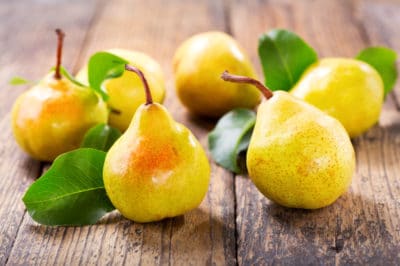Winter vs. Summer Pears
Most well-known pear varieties are winter pears. These varieties are available in the winter time because they will store. They tend to be long season fruits harvested in the autumn season.
Summer pears will only store for a few weeks unless preserved through canning, freezing, or drying. The only summer pear that will store is the Bartlett, but its shelf life is not the same as a winter pear.
Winter Pears
- Bosc
- Comice
- Concorde
- Forelle
- Anjou (red and green)
Summer Pears
- Tosca
- Starkrimson
- Bartlett (all types)
Storage Conditions
Keep fruits at 30°F (1°C) or as close to it as possible. Cold is the essential ingredient for perfect pear storage. Any warmer conditions and the pears will start to ripen. If the pears freeze, they turn to mush.
A refrigerator is a perfect place to keep pears for long-term storage. If that isn’t possible, consider using an insulated but unheated outdoor building through the winter. In these conditions, winter pears keep for five months. Bartlett pears keep for three months.
Ripening
Leave the pears in cold storage for a few weeks before taking any out. Cold storage is necessary for them to ripen evenly. Grocery store pears chill for two to six weeks. Bartletts only need two days.
Once that amount of time passes, you can pull out fruits and ripen them on the counter as you want them. The longer they’ve been in cold storage, the faster they’ll ripen. Bartletts will ripen the quickest within five days. Bosc and Comice pears will ripen within seven days. Anjou will take up to ten days to fully ripen.
Test if fruits are ripe by pressing slightly with your thumb at the neck around the stem. If the fruit gives easily, it is ripe. Pears are notorious for having a short window of ripeness. Only take from storage what you will eat that week.
Preservation
Winter and summer pears alike can be preserved for later eating. The most common methods include canning and freezing. Because you use sugar in the canning recipe, it doesn’t require a pressure cooker to do safely.
Pears are great for dehydrating. Dehydrated pears will keep for months and make delicious snacks.
